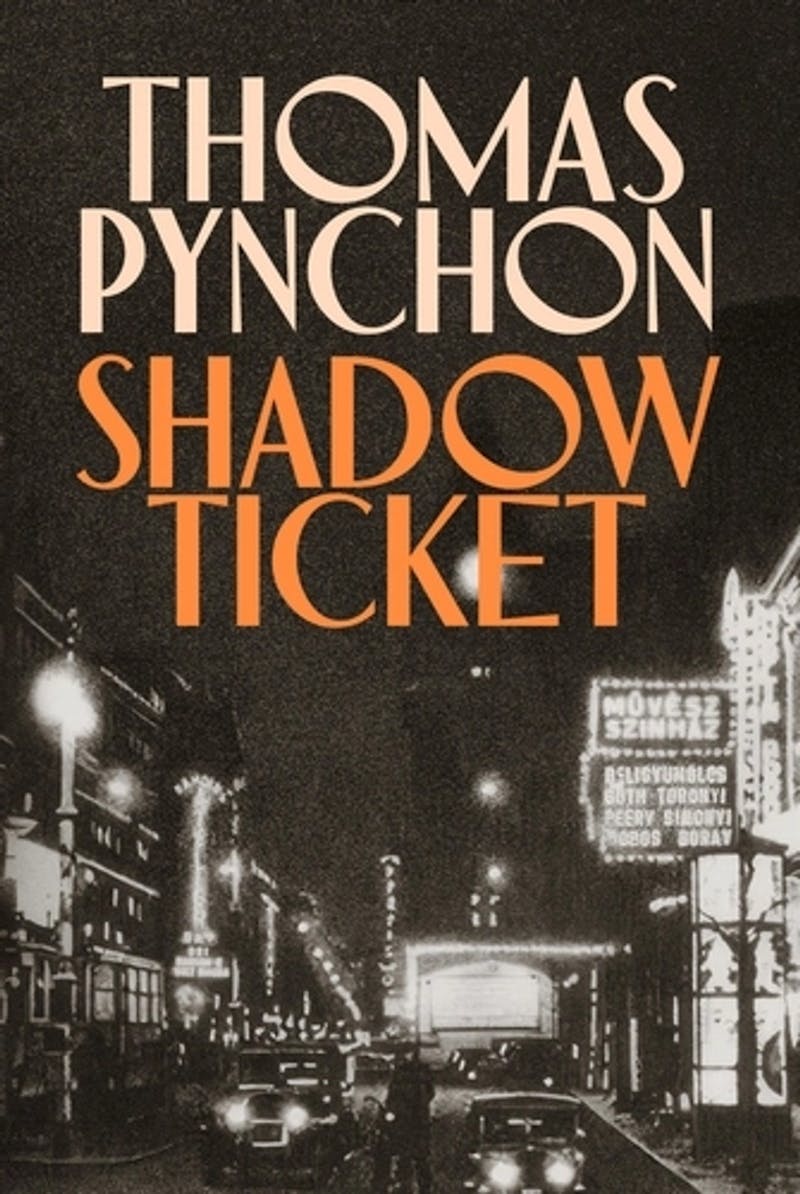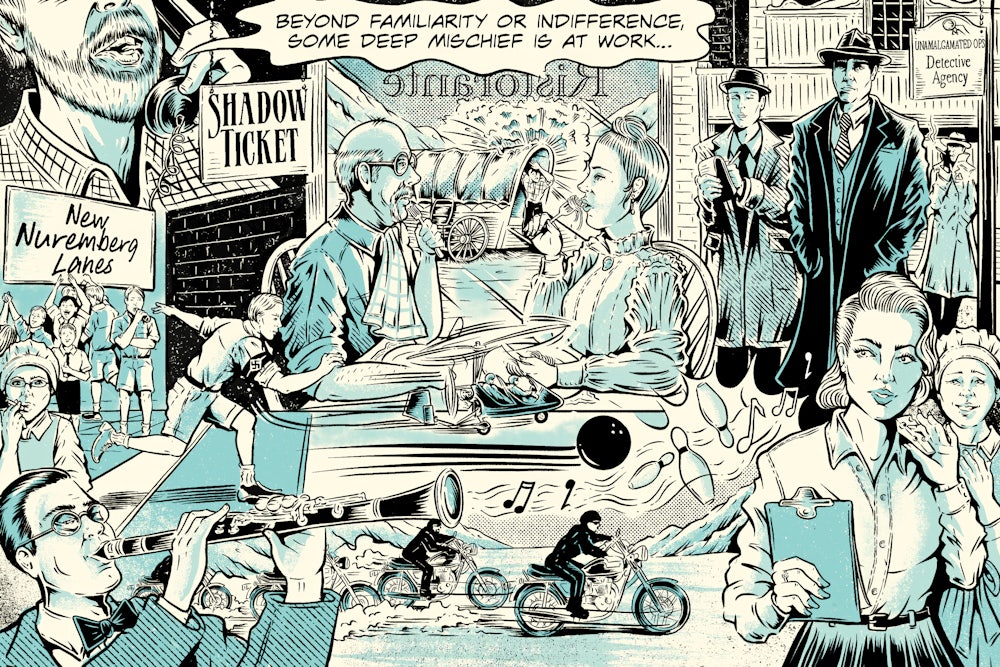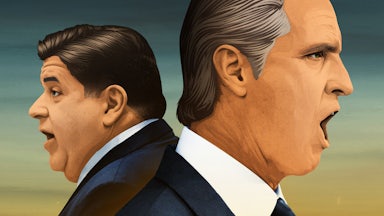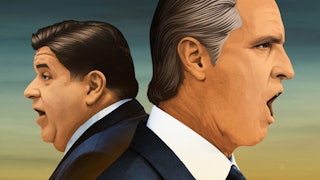Like Gravity’s Rainbow, Thomas Pynchon’s latest, Shadow Ticket, begins with a boom. Back in 1973, the big explosion came courtesy of a V-2 rocket, wailing over wartime London, saddled with a deadly payload and one of the most famous openers in the literary history: “A screaming comes across the sky. It has happened before, but there is nothing to compare it to now.” The supersonic rocket and its description introduce the tone and theme of a neutron-dense novel that has variously been described as “terribly haunted,” “profoundly exasperating,” and “one of the best-realized paradigms of our century.” With its exhaustive remit—the brainy, slangy, horny, endlessly funny book is a chronicle of the twentieth-century death-drive, aroused by humanity’s perverse faith in technological progress, filigreed with a giant octopus, a sentient revolutionary light bulb, coprophagic indulgence, a song about suicide, and reflections on the moral dignity of pigs—Gravity’s Rainbow presented a problem. When a book encompasses so much, what is left to say? The novel, after all, ends with the annihilation of not just the world, but its own narrative.

Pynchon did not produce another novel for 17 years, and, famously private, he avoided being interviewed, photographed in public, or otherwise pinned down by the Literary Industrial Complex during his absence. Vineland (1990) marked the end of an extended leave during which, David Foster Wallace remarked, Pynchon appeared to have “spent twenty years smoking pot and watching TV.” Mason & Dixon, another phone book–thick historical epic, from 1997, was a more fulsome return to form. His longest novel, 2006’s Against the Day, was almost deceptively maximalist, busy in its plotting with considerably less on its mind than its predecessors. Then came Inherent Vice (2009) and Bleeding Edge (2013), riffs on detective fiction—marginally more accessible novels that the critic Michiko Kakutani has called “Pynchon Lite.” These demonstrably lower-key efforts spurred some of Pynchon’s more obsessive devotees to imagine that the now 88-year-old author was surely laboring over another gargantuan masterpiece. Rumors of a mothballed meta-historical magnum opus have long circulated in the Pynchonite underground, at least since Salman Rushdie referred to some “900-page Pynchon megabook about the American Civil War” in his review of Vineland.
Bummer, then, that Shadow Ticket lands with more of a soft thud than a bang. Pynchon’s latest (and possibly final) book is a lively, amusing yarn, unfolding across the American Midwest amid the Great Depression and Central Europe under the sinister umbra of rising fascism. It may be Pynchon’s most purely comic novel to date. But at 304 pages, it is also his shortest since 1966’s The Crying of Lot 49. And worse than short, it is slight. To read the Pynchon of Gravity’s Rainbow or Mason & Dixon is to encounter nuclear-grade creative intellect, radiating with an excess of intoxicating ideas, ludicrous images, and formal experiments. Read forgivingly, Shadow Ticket may be an exercise in late style: the author bucking all those busy excesses. Yet, without that overabundant quality, it’s hard to place Shadow Ticket. What is a Pynchon novel without its sense of unruly bigness that builds, upon each encounter, with the mounting bafflements of an increasingly puzzling world?
Shadow Ticket’s inciting blast is smaller than Gravity’s Rainbow’s wailing opener. Pynchon captures the bombing, as heard from a local Italian eatery, with cinematic precision: “Forks and glassware pause between tabletop and mouth, as if everybody’s observing a moment of stillness, and nobody seems surprised… Everybody is looking at everybody else like they’re all in on something. Beyond familiarity or indifference, some deep mischief is at work.” The target turns out to be the “hooch wagon” of a Milwaukee bootlegger named Stuffy Keegan. (Lovers of “Pynchon names,” take heart. Mr. Keegan is joined by the likes of Connie McSpool, Boynt Crosstown, Dr. Zoltán von Kiss, G. Rodney Flaunch, Lino “The Dump Truck” Trapanese, Heino Zäpfchen, Fancy Vivid, and Hoagie Hivnak, to name just a few of the novel’s motley dramatis personae.)
Following that “deep mischief” to its source is the job of Shadow Ticket’s protagonist, Hicks McTaggart. Formerly rank and file in a union-busting goon squad, McTaggart now works for Unamalgamated Ops, a detective agency that (contra its name) appears to have a global footprint. Hicks is a familiar Pynchon archetype: a gumshoe like Inherent Vice’s P.I. Doc Sportello or Bleeding Edge’s fraud investigator Maxine Tarnow, and a streetwise shlemiel, in the model of Gravity’s Rainbow’s Tyrone Slothrop, Vineland’s Zoyd Wheeler, and Benny Profane, V.’s discharged seaman and “human yo-yo.” Pynchon’s characters have a way of being jostled around by forces outside their control, or beyond their reckoning. Call it fate. Call it conspiracy. Call it the insistent nudging of history itself. Hicks McTaggart seems especially susceptible to these influences, knocking around the novel like a greased-up pinball.
Hicks is barely on the case of Stuffy’s exploded hooch wagon before he’s hit with another assignment: to retrieve Daphne Airmont, heiress to a million-dollar cheese fortune, and thwart her romance with hepcat Hop Wingdale, clarinetist of the Klezmopolitans. Daphne’s father, Bruno Airmont, is known across Wisconsin as “The Al Capone of Cheese in Exile,” having vamoosed to parts unknown, under strange circumstances. Previously, Hicks had helped Daphne out of a jam, when she was freshly hatched from a mental hospital. In keeping with the beliefs of the local Ojibwe, Hicks finds himself spiritually bound to her, forever. It’s the sort of cosmic debt that the low-life dick could frankly do without. Same goes for rubbing elbows with any of these upper-crust “plutes.”
Hicks’s fetch-quest to recover the “Madcap Subdeb Cheese Heiress” sees him cutting a broad swath across the Midwestern underworld, circa 1932. Shadowed by his sorta-sidekick Skeet Wheeler (forebear ofVineland’s Zoyd, perhaps), “a flyweight juvenile in a porkpie hat,” Hicks rubs shoulders with Italian mafiosi, soda jerks, prohibitionist G-men, lucid dreamers, Bolshevik dairy farmers, and a troubling number of Nazi sympathizers. In the basement of a bowling alley called the New Nuremberg Lanes, he happens upon Midwestern Hitler Youth swing-dancing to a reworked version of the “Horst Wessel Song.” Hicks’s own uncle, the ironically named Lefty, insists that “Der Führer … is der future.” Such fascist foreboding comes more explicitly to bear when Hicks is drugged and shanghaied across the ocean to Hungary—following the trail of both the would-be dairy queen and bootlegger Stuffy Keegan, believed to have fled across the pond aboard a “rogue Austro-Hungarian U-boat.”
Shadow Ticket’s first act plays things fairly straight—particularly for a Pynchon novel. For all the silly names, songs, strange detours, and reflections on Nazis “foreign and domestic,” the book feels like a fairly trifling piece of period pulp fiction.
Pynchon finds an ideal form (or cover) in the hard-boiled detective story. Both the genre and the author are known, even beloved, for their capacity to obfuscate. They pile on subplots, side characters, twists and turns, which to the sensitive reader are a pleasure in themselves. Such shaggy dog stories suit an author whose style has been accused of being mostly shag, with relatively little in the way of actual canine. Matters of plotting and characterization have, in Pynchon’s novels, always felt secondary to extended jeremiads on history and ideology and rocket science, or to the cultivation of a general atmosphere of carnivalesque zaniness. In Shadow Ticket, they seem especially subordinate.
Loyal readers will likely relax a bit in the book’s European section, where that circusy vibe dominates, and the author’s capacity for sheer, iridescent creativity is on full display: vampiric gangs, gyrocopter escapes, a roving motorcycle parade called the Trans-Trianon 2000 that zooms across the “shadow zone between the concentric Hungaries old and new” like something out of a Mad Max sequel; references to Eukodal (an early name for oxycodone, a reported favorite of Hitler himself), international cheese syndicates, guerrilla Croat training camps, and a search for a hideous lighting fixture “considered the crown jewel of tasteless lamps, a lamp so stupefyingly tasteless it makes nonsense of the tasteless lamp category itself.” There are instances of the supernatural as well, from the invocation of ancient Indigenous wisdom, to repeated occurrences of “apports”—objects conjured or transferred in ritual séances. (Lew Basnight, a “psychical” detective last seen traversing freely across time and space in Against the Day, also makes a cameo.)
In Pynchon, such tumid smorgasbords of hodgepodge esoterica serve as mere set dressing. There are, typically, Big Ideas undulating underneath the insanity. The interwar Hungary of Shadow Ticket is a familiar Pynchonian landscape; not just in its messy mise-en-scène, but in its larger theme. Like the post–World War II “Zone” of Gravity’s Rainbow, the pre-Revolutionary America of Mason & Dixon (“a very Rubbish-Tip for subjunctive Hopes, for all that may yet be true”), and the titular NorCal hippie enclave of Vineland, Pynchon’s Europe is a kind of anarchic free state, at once full of possibility and beset by a looming fear. Lines are being drawn. Freelance hustlers and black-market grifters find gainful employment both hunting down Jews and smuggling them to safety (or the temporary illusion of it). As Pynchon describes it: “People are keeping company here who, if history had a shred of decency, would never be allowed within miles of each other.” As one of Hicks’s European contacts, an agent of a low-rent MI6 spy shop called MI3b, notes:
It’s a strange time we’re in just now, one of those queer little passageways behind the scenery, where popes make arrangements with Fascists and the needs of cold capitalist reality and those of adjoining ghost worlds come into rude contact.
Because Pynchon’s books are such rarities, the Halley’s Comet–like arrival of a new one at the current “strange time” cannot help but feel a little auspicious. It is tempting to read Shadow Ticket’s dread about the rising tides of fascism, antisemitism, and general lunacy against the derangements of our current moment—and of the United States specifically. (One may be reminded of Pynchon’s winking warning in his description of Against the Day: “No reference to the present day is intended or should be inferred.”) When a cop in Shadow Ticket decries the mega-wealthy cheese tycoon Bruno Airmont as not “an evil genius but … an evil moron, dangerous not for his intellect, what there may be of it, but for the power that his ill-deserved wealth allows him to exert, which his admirers pretend is will, though it never amounts to more than the stubbornness of a child…,” the description naturally calls to mind any number of present-day personalities. Ditto the warnings of an energized authoritarian creep. “I know that going back to the U.S.A. will only be buying time,” the heiress Airmont warns, “that sooner or later no place will be safe.”
Elsewhere, the compulsively coke-sniffing police officer Egon Praediger sets the table even more ominously, adrift in a “prophetic trance”:
This is the ball bearing on which everything since 1919 has gone pivoting, this year is when it all begins to come apart. Europe trembles, not only with fear but with desire. Desire for what has almost arrived, deepening over us, a long erotic buildup before the suffering instant of clarity, a violent collapse of civil order which will spread from a radiant point in or near Vienna, rapidly and without limit in every direction, and so across the continents, trackless forests and unvisited lakes, plaintext suburbs and cryptic native quarters, battlefields historic and potential, prairie drifted over the horizon with enough edible prey to solve the Meat Question forever…
Such spooky, serpentine diatribes—spiked with punchy little phrases, like referring to all of human life as “the Meat Question”—are Pure Pynchon™. It’s a shame that they are in short supply. Strange, too, that the author cedes these more familiar free-jazz exegeses to a cokehead cop, when they used to be the very imprimatur of his own authorial voice. Which points to another notable tic of the novel: It is conspicuously dialogue-driven, yet most of the characters prattle in the same, tricky-to-distinguish hard-boiled patois. Pynchon’s characters have always been cipher-ish: stand-ins and synecdoches representing larger systems, or mouthpieces for maniacal ideas. Even still, bracketing some rare exceptions, Shadow Ticket’s expansive cast comes across especially same-y—all speaking in the same idiosyncratic manner but without a governing intelligence.
Though funny, and brisk, and occasionally astonishing, Shadow Ticket cannot help but feel a little warmed over. It’s not just a matter of those all-too-familiar authorial hallmarks (weird names, sing-alongs, deep-cut historical trivia, etc.) but of the book’s basic theme. The arrival of fascism in America was already a big-time bugbear way back in The Crying of Lot 49 and Gravity’s Rainbow, more than half a century ago. And—apart from some rather detailed accounts of various vintage motorcycles—the interwar, continental setting adds little to Pynchon’s already masterful mapping of the tangled legacies of colonialism, authoritarianism, internationalism, rank technological fetishism, and the cultlike worship of death.
In places, lack of inspiration skates uncomfortably close to hackery. Late in Shadow Ticket, Pynchon cooks up a routine about Vlad the Impaler. “Since I took power,” Vlad laments, “the threat of Turkish invasion has fallen to zero—do they call me Vlad the Invasion Preventer? No… But! Run one stake through one small-time chiseler…” Pynchon is basically tracing over a shopworn street joke about certain of Catherine the Great’s, let’s say, equine proclivities. In other words: It has happened before. But there’s plenty to compare it to now. It’s a version of the same problem that has bedeviled Pynchon’s books, to varying degrees, since the publication of Gravity’s Rainbow. Having said all there is to say, well, what else is there?
Given Pynchon’s age, and indications that he is making arrangements for his own exit—i.e., by selling his extensive and characteristically secretive archives to the Huntington Library in San Marino, California—there is a natural, if somewhat ghoulish, hankering for Shadow Ticket to serve as a capstone or summative statement. For those same reasons, the novel hangs under a pall of melancholy. Perhaps the book itself is a kind of “apport,” conjured via séance by an invisible author who may (for all we know) have already performed his last vanishing act. Whatever its shortcomings, Shadow Ticket should still rightly be regarded as an artifact from a writer who is altogether sui generis: a rare, and perhaps final, gift—like getting a postcard from an old friend, dispatched from another dimension. Or a rambling crank call from a weird uncle you haven’t heard from in years.
Shadow Ticket dims with Stuffy Keegan back aboard the rogue U-boat, piloting toward some mysterious, uncharted “counter-domain of exile.” Hicks, meanwhile, realizes he’s not headed back Stateside anytime soon himself, and attempts to adjust to the new reality of his “post-American life.” As he lingers in limbo, lost in the widening gyre of a Pynchonian historical interregnum, he receives a message from his old pal Skeet, detailing his plans to head out west, chasing the sunset across that vast prospect of Pynchonian, and American, possibility: California. It seems there are still zones to map, frontiers to chart, literary and intellectual landscapes to discover. And a whole class of hardscrabble junior partners are already on the case.




